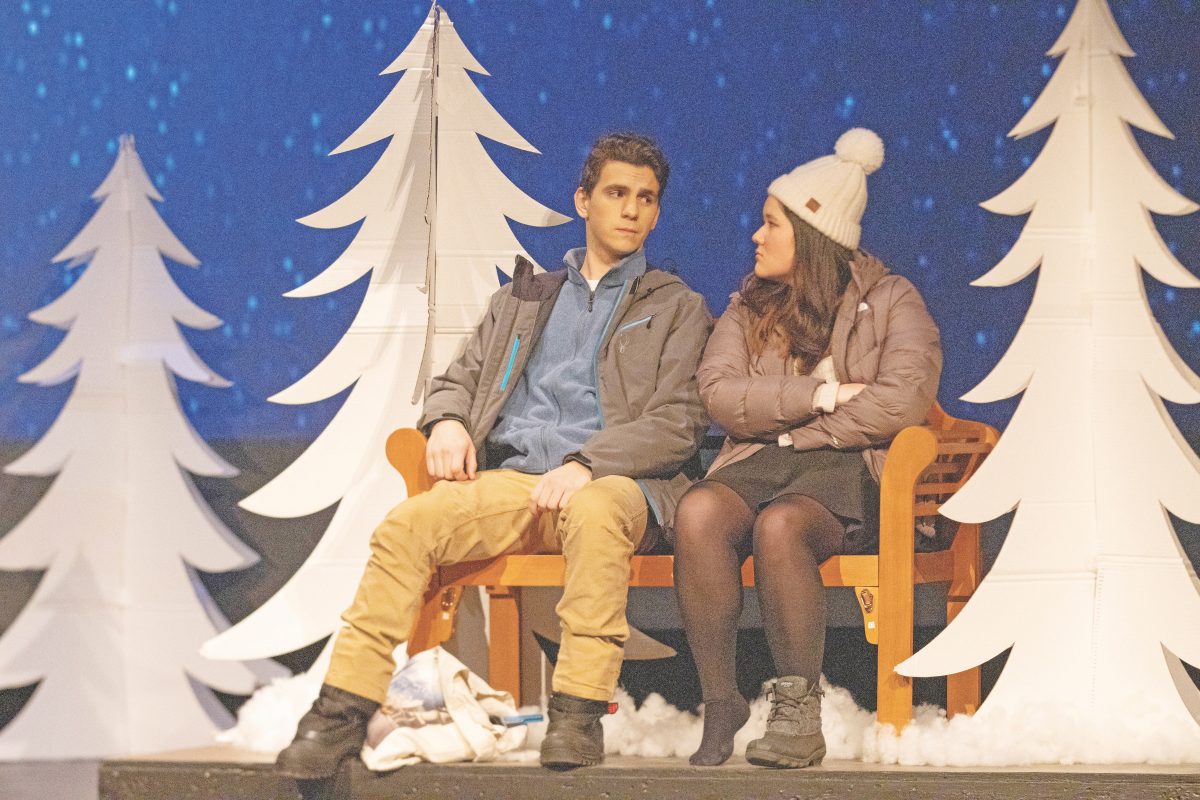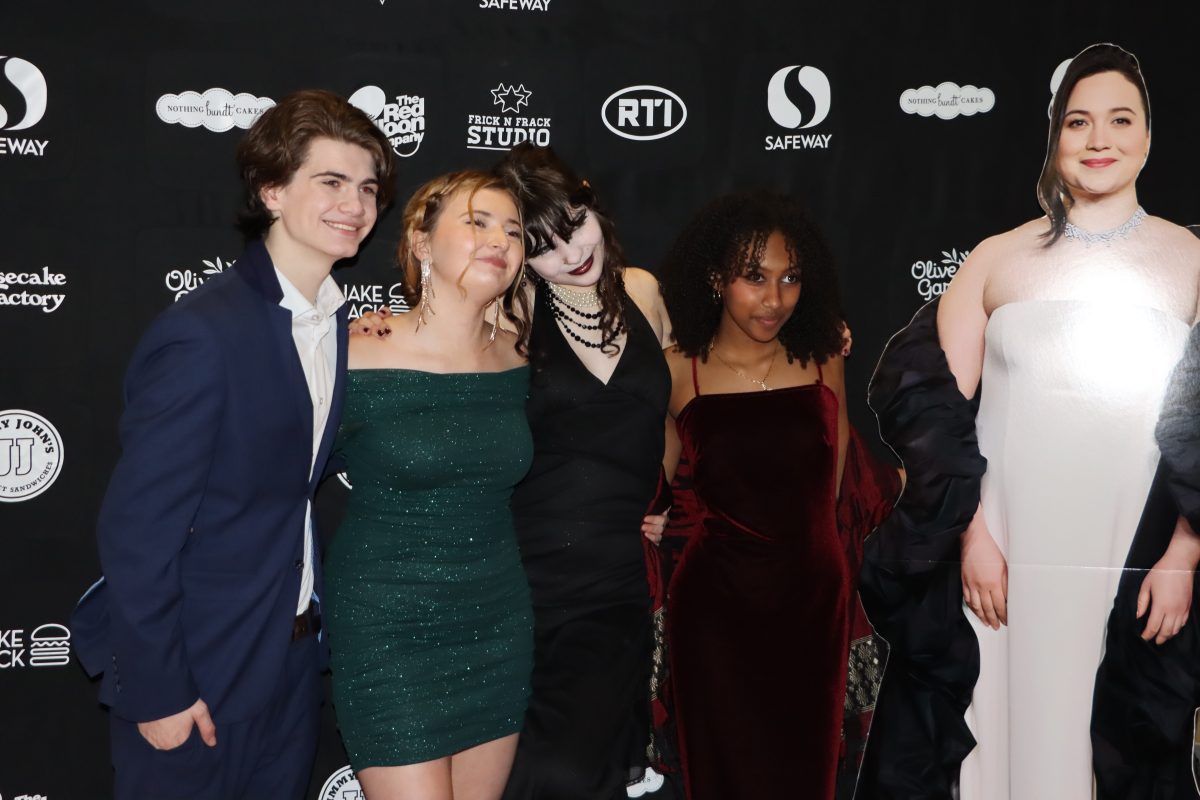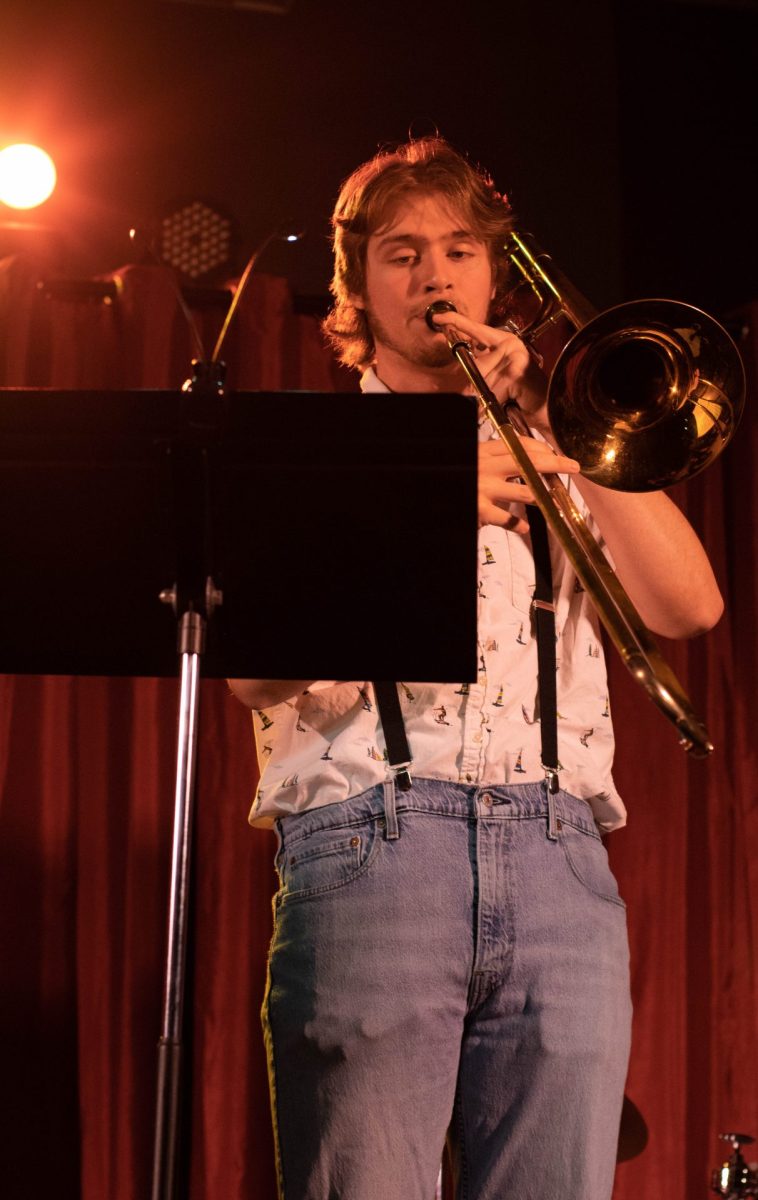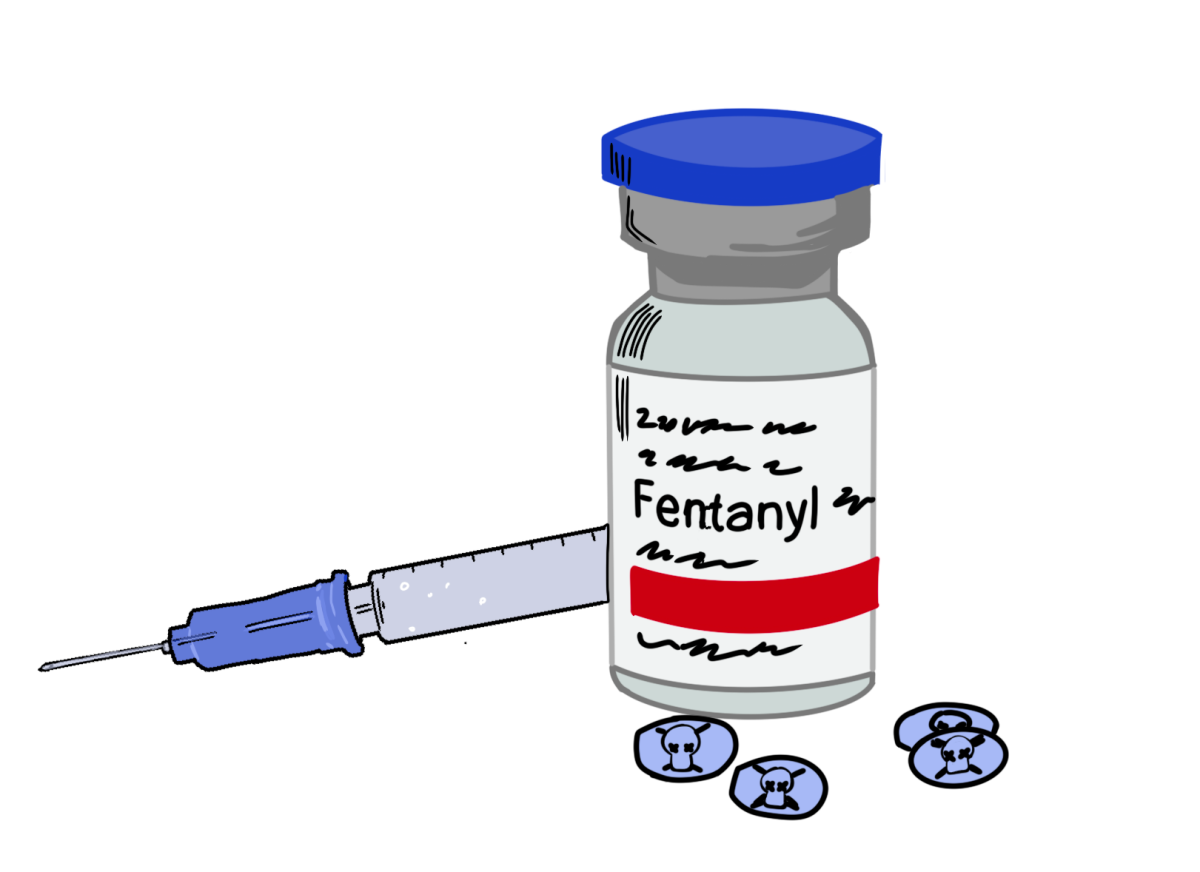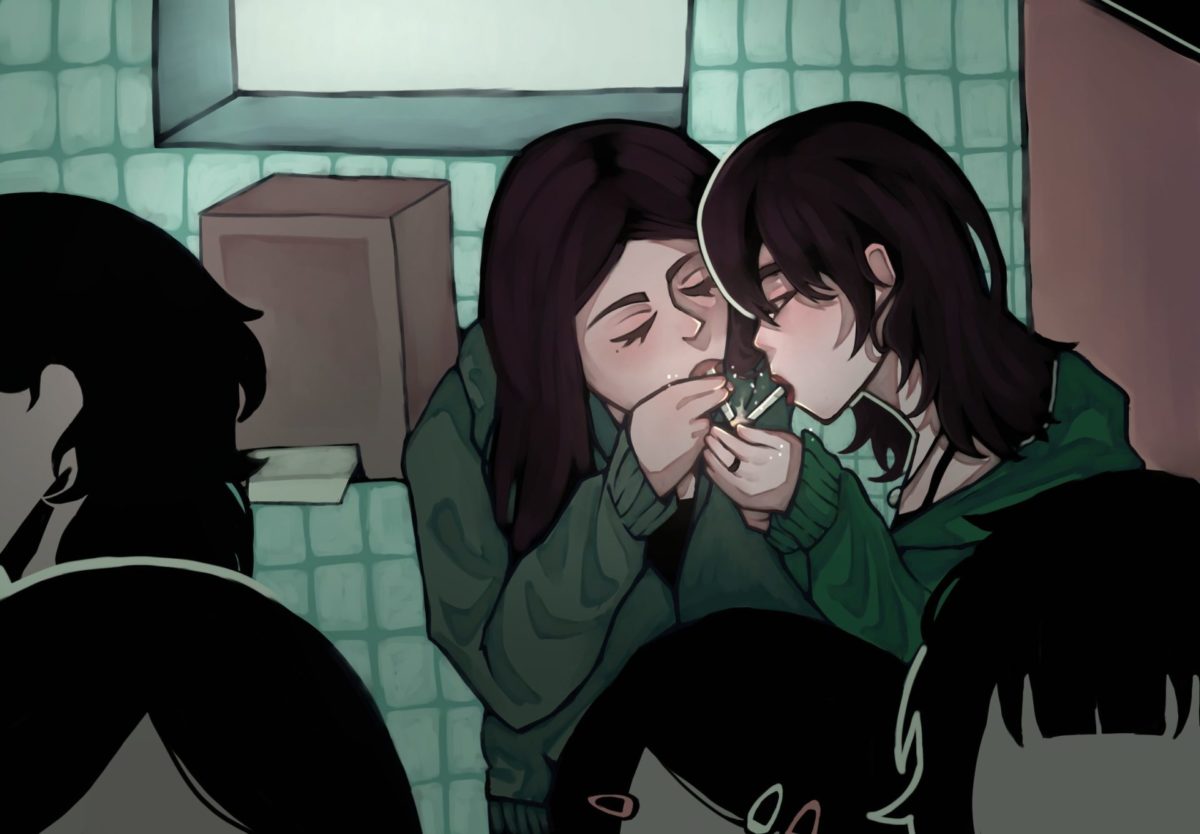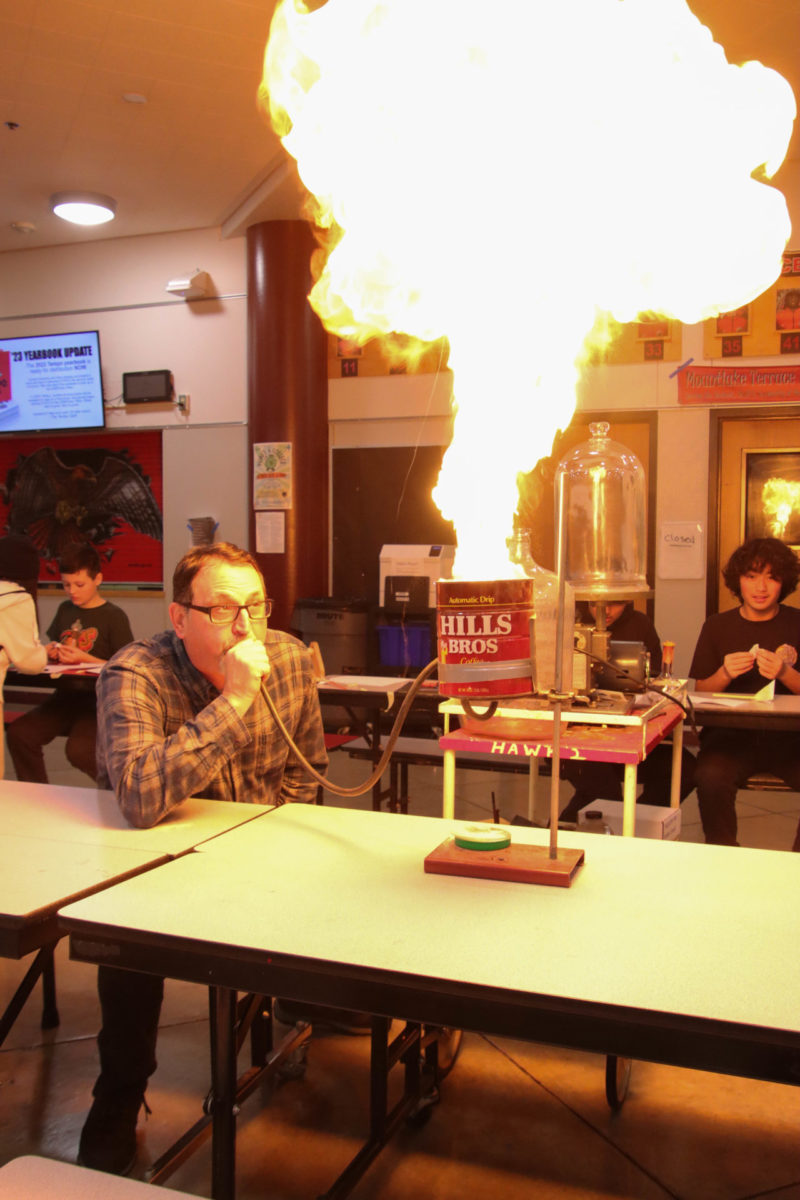Students gathered in the MTHS Theater during fifth and sixth period on June 1 for the eighth annual Humanities Film Festival.
To kick off the festival, English teacher Steve Merlino explained how much prep work each film maker put into their piece. He said the amount of setting up, filming and editing that the students put into their work was phenomenal. Merlino gave praise to every student that sent in a film.
“I think that many of you learned that [you will put a lot of time into something] with this [Film Festival], and that happens when you really care about something,” Merlino said.
He also said this can relate to a student’s school work because the dedication and commitment he saw being applied could easily relate to homework or a school project.
Afterward, the sophomore’s films were played. Humanities teacher Christopher Ellinger had a few words to share about how much he appreciated the work and thought he saw each student put in their final project.
“The chaos of the Film Festival drives me crazy because I’m not in control, but when I see the end project, I’m always so proud,” Ellinger said.
The first film that was shown was called “How Long Until You See,” written by Leeann Weatherby and Mindy Felber.
The film starred Weatherby and sophomore Danny Smart as two high school sweethearts who grew old together. It was a black and white film with a voiceover by Smart and depicted the couple as an old couple reminiscing on their life since they met each other.
At the end, the couple had aged and they were sitting, eating dinner. The woman asked her husband “Do you still love me?” and he replied, holding her hand, “How long until you see? You will always be beautiful.”
It received many “awww’s” from the crowd along with credits from Ellinger for having a voiceover rather than acting, as he he said has seen a lot of bad acting in the past.
The second film was “Reverse Hiccup,” a comedy written by Sarah Schank, Margaret Latta and Ben McGraner.
The film depicted a group of students sharing ideas on what type of film they should make, everything from a hipster James Bond to a “classic post-apocalyptic movie.”
As they shot out ideas, they played small clips of what the film would appear to be like. Many of the clips collected laughs from the audience, a favorite being a parody of “Jackass,” in which one of the stars was arrested at the end, yelling “I’m too swag for jail!”
The film ended with another actor coming into the room, suggesting they incorporate all of their ideas into one and play the Star Wars theme with the ending credits.
This was an obvious favorite from the crowd, earning an impressive amount of cheers and applause as the credits rolled.
The penultimate sophomore film was, according to Ellinger, the second time he had played the role of Michael Scott from the hit television series “The Office.” The film was called “The Office-the Dojo” and was written by Meeka Diaz, Ben Merril, Nicholas White and Lauren Wiedesrspohn.
It followed The Office’s plot, everything from the infamous “that’s what she said” joke to Jim Halpert playing practical jokes on Dwight Schrute.
In this film, Halpert convinced Schrute their company needed a “special secret agent” and that he needed to save them from bombs hidden in their pencils.
Schrute ended up confronting a pizzeria he thought was behind the plan and was both embarrassed and angry with Halpert.
The final sophomore film, “Voice.” or, dubbed by Ellinger, “The Sleeper” was written by Sammy Abebe, Chris Ban and Liza Manevich.
A silent film, it depicted various disabled students being bullied at school. As they were being picked on, a black screen would show with write letters reading things such as “What did I do wrong?” and “I just wanted a friend.”
Then it showed the characters contemplating suicide as they’re holding pills, standing off a balcony and stepping on a chair that has a noose hanging above it.
The screen flickered black and white and then rewound to the very first scene, a boy being picked on for not being able to read a passage from a book. This time, instead of his classmates shaking their head and laughing, it showed them helping him and smiling.
This happened to each scenario, people helping instead of hurting. Each time, the same black screen with white writing showed but this time it read “Thank you.”
The film ended with it reading “Give us a voice” and loud claps and cheers from the audience.
Ellinger noted how hard it can be to show such a serious topic, but he believed his students handled it well.
“Reverse Hiccup” was announced as the sophomore class winner, earning the prize of a $5 gift card to Dicks.
There was only one junior film to be shown, “Fear” written by Mark Nguyen and Aidan Waugler.
It depicted Nguyen finding a pile of papers, each reading something sinister such as “FEAR: FIGHT OR FLIGHT,” and “THINK THE WORST.”
The film flashed to the stereotypical fears, including spiders, war and atomic bombs.
Nguyen started panicking and his humorous fear face had the audience laughing in between the flashes of gruesome pictures.
As the only junior film, “Fear” won the prize for best film. Merlino said he was very proud of this film and the vision Nguyen and Waugler had. He gave props to the two filmmakers, especially Nguyen who played the featured music himself.
The last four films were created by seniors.
Humanities teacher Erin Grambush set the theme “rebellion and conformity” for her student’s films. She praised her classes, saying she believed her class came up with some really creative ideas.
The first senior film was a comedy, “Heart of the Cards,” written by Josh Hopkins and Michael Hunt.
It told the stories of the stereotypical “jocks” making fun of a group of “nerds” playing Yu-Gi-Oh cards. They smashed the cards from the table, causing the audience to laugh.
The next day, two of the boys found a bag of Yu-Gi-Oh cards and played each other, secretly. When their peers discovered them, they said they stole them and were about to burn them in the park. Their friends insisted they burn the card where they stand, so they set fire to the bag.
While the bag holding the Yu-Gi-Oh cards shriveled up, “Ring of Fire” by Johnny Cash played. The audience laughed at the faces the actors made as they watched the cards burn.
The next day, the two boys played Yu-Gi-Oh openly in the MTHS library. They were confronted by their friends, who revealed that they also liked to play the game but only “talked crap” because the other two didn’t appear to like the card game.
Grambush said that this scene proved to be the hardest for the film makers due to people in the library background making faces or inappropriate gestures. They had to reshoot this scene multiple times because of that.
In the final scene, the group of boys played a tournament against each other with Yu-Gi-Oh cards. The credits rolled and the audience cheered.
The second senior film was “Effortless,” a more dramatic film written by Madi Asbell and Esther Babko.
There was no dialogue in the film. Instead, Colbie Caillat’s “Try” played throughout the scenes.
It showed a teenage girl waking up early and going throughout the typical routine: doing her make up, curling her hair and getting dressed.
When she arrived at school, however, her hard work did not appear to pay off because her peers ignored her. In one scene, she asked classmate something and another classmate pulled them away from her attention.
After school, she goes home with hands overflowing shopping bags full of expensive clothes and make up. She lay the bags on her bed and became frustrated over how petty they appeared to her, knocking them off her bed.
The girl proceeded to donate her new clothes to charity, wipe off her make up and smile.
Grambush said this film nearly made her cry and praised him.
The third senior film was “Defiance,” written by Colin Rucker and Mckenzie Creagan.
The first scene depicted a boy in class receiving a text from his mother. It read “Carter is out.”
The boy went home to meet Carter, his older brother. It was soon apparent that Carter had recently gone to prison for gang affiliation.
Carter asked his younger brother to join his gang since a recent member had just died. The boy told Carter he would think about it and later texted a friend asking for help.
The boy’s friend told him he should not join and stay as far away from gangs as possible. The boy didn’t take his friend’s advice, and after school the following day he went through “initiation” which involved attacking a rival gang.
Afterward, he received another text from his friend who saw a shoot out on the news and asked if he was involved. He admitted that he was and his friend was disappointed and upset.
The next day, the boy told his brother he didn’t want to be in a gang anymore. Carter argued with him, asking him why he would go through all that just to quit and telling him the rival gang won’t let him quit. He pushes this, saying, “They will kill you.”
Afterward, the boy walks home from school. A car followed him and began to slow down, but when he started to run he was shot and killed by the rival gang.
The Film Festival ended on a lighter note with a comedy named “The Candy Man” written by Andy Phung, Brady Jackson and Kyle Blake.
It featured a boy who was having a regular day. Just as he left leaving for school, his father warned him to be careful of a man in a white car.
As he walked to school, a man in a white car pulled up next to him, offering candy. The boy asked him why and he responded “because I’m the Candy Man.” The audience laughed at the Candy Man’s crazed eyes and smile.
When he returned home later that day, the boy was reprimanded by his father for receiving bad grades. After being grounded and getting angry at his father, the boy stormed from the house.
The Candy Man stopped him again, but this time he got into the car with him. The Candy Man took him to the park, where it showed them on enjoying themselves on the playground while “Best Friend” by Harry Nillson played in the background. The silly nature of this scene, especially when they feed each other ice cream, had the audience roaring with laughter.
As Candy Man pushed the boy on the swing, the camera zoomed in on the Candy Man’s crazed eyes and creepy smile.
The camera flashed to a scene of the Candy Man dragging a trash bag holding something large, presumably the boy, to a dumpster. The film faded out, and white words appeared on the screen reading, “Stay away from strangers.”
Grambush said she enjoyed this film, saying it had her “cracking up then feeling like a horrible person.” She said she was tentative in allowing the group to do this film, but was proud with the results.
The best in class award was given to “Effortless,” which Grambush was happy to present.
Best film overall was voted on by the audience. During the time the votes were being counted, the Humanities teachers played “fillers.” These films did not make it into the Film Festival, but still received high praise from their teachers for the hard work and dedication the students gave the assignment.
The Humanities teachers announced the overall winner as “The Candy Man.” Grambush laughed as she handed the students their award and patted each on the back. She said she was very proud of them for doing so well with their assignment.



